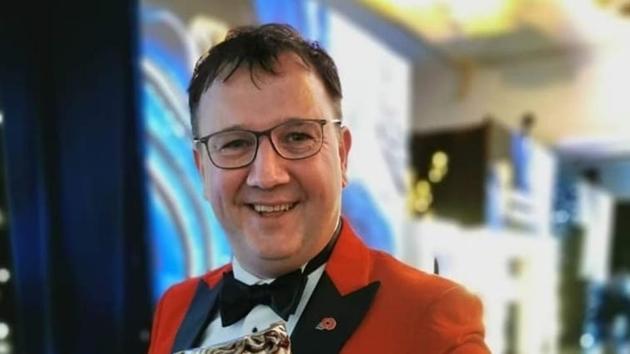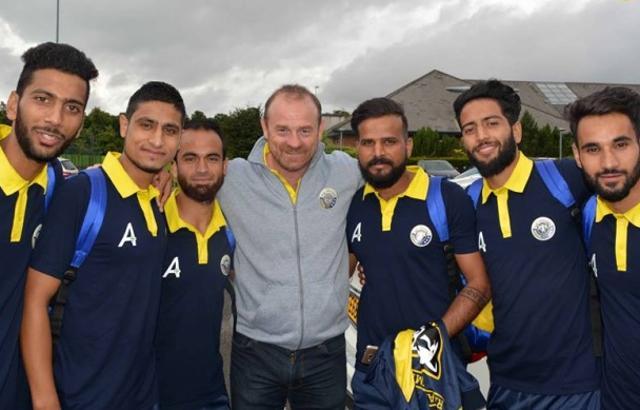Kashmir’s football team wins again
Documentary filmmaker Greg Clark talks about his film on Real Kashmir and how he followed a BAFTA Scotland winning story
Real Kashmir FC, a BBC documentary on a Srinagar football club, has won a BAFTA Scotland award. It traces the story of the troubled state’s only team in the country’s professional I-League. It’s a team made up of players from across the state, country and beyond, who shoulder the hopes of a people who now gather in the thousands to watch ‘their’ team play.

Real Kashmir has had a sort of fairytale journey since its inception in 2016. For one thing, they acquired a renowned head coach in David Robertson, a former Scottish footballer, in 2017. They went on to secure the top spot (second division) in the I-League in 2017-18 and then third position in the I-League (first division) in their maiden tryst at that level, in 2018-19.
Excerpts from an interview with Greg Clark, director of the film, Real Kashmir FC.
Why did you decide to make this film?
As a documentary maker I wanted to make a film on somewhere distant. That is when I came across David Robertson’s story. He was a top footballer who had played for clubs like Glasgow Rangers and Leeds United. He had earlier coached the American third division team Phoenix FC, but the Kashmir team was a completely different challenge.
I had never visited India back then. All I knew about Kashmir was that it was a place with a lot of political turbulence. It made me really curious as to why David would decide to do such a thing.

Did you meet David before you left for Kashmir?
In March 2018, David was home for a break and we spoke. In this conversation, it became clearer to me that this stint was not just a career move for him but an important personal challenge. David had heard from his agent that Kashmir FC were looking for an international coach and he decided to take it up, turning down offers from clubs in Uganda and China. It was a personal challenge for him to see what he could do with the team.
He then talked to me about how, on some days, practice had to be called off because there has been a killing or a strike. It seemed a very distant world, sitting in Scotland.
What was it like when you first got to Srinagar?
I landed in Srinagar in August last year and I was terrified. There were soldiers on the streets everywhere. A militant leader had been shot dead a few days later and practice for the team was called off. Landing in Kashmir can be a shock even for Indians and for me it was a psychological journey. But in a few days, I started to shed my prejudices. I was making genuine friendships and was introduced to the warm Kashmiri welcome and hospitality.
You got quite close to the team. What was that like?
As I got to know the team, I explained that what they were doing was very significant but if I was to show them in their moments of triumph, I also needed to show them when they were low. And there were many such moments, be it the day when the final match between Minerva, Punjab and Kashmir FC in the Jammu and Kashmir Invitation Cup was called off after a blast or when they were told they wouldn’t be getting to play on home ground for some of the I-League matches.
But there were magical highs too. It was wonderful to see how the confidence of the players shot up after they defeated Minerva, the defending champions, for the first time. That match decided that Kashmir FC was in it for the long haul.
That is the kind of moment this story is about. Even though my film is centered on football, it is a human story about these boys building something with their coach, something they can be proud of.
How does the setting of Kashmir affect that?
Nelson Mandela had said that football can touch people in a place that politics can’t. We see that here. In many other places you can plan a life, holidays, investments. In Kashmir you do not even know if there will be a curfew the next day.
In such a situation, an athletic challenge provided the boys clarity — a place where none of those barriers exist. It is just you and the challenge. That was what I got from the players. All they wanted to do was to play football. And whatever they do eventually, the emotion of a thousand people screaming their names will be etched in their memory forever.
Catch your daily dose of Fashion, Taylor Swift, Health, Festivals, Travel, Relationship, Recipe and all the other Latest Lifestyle News on Hindustan Times Website and APPs.



